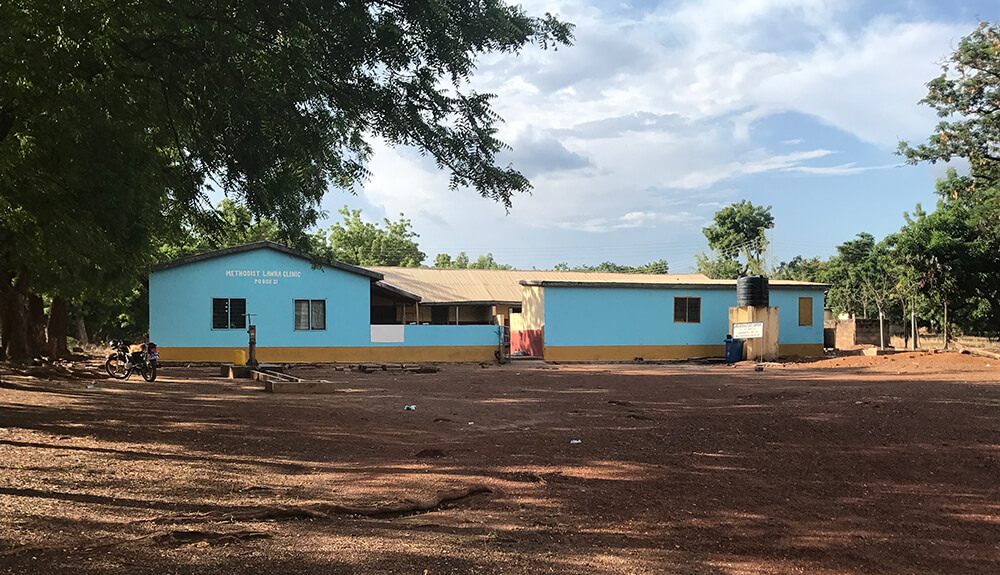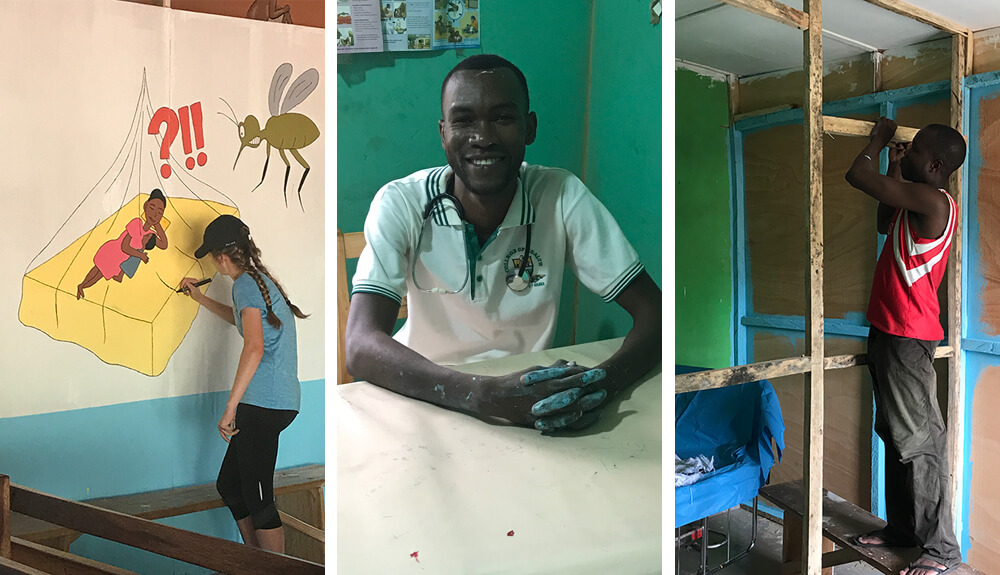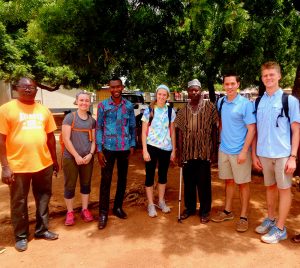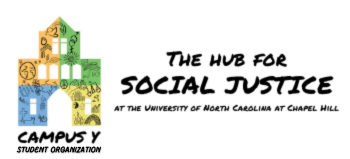
The following blog was written by Jacob Stocks and Gretchen Blankinship.
We are members of the Campus Y organization Project Heel, and this past May we traveled to West Africa where we partnered with a primary school and the Methodist Clinic in Lawra, Ghana. Lawra is a rural community located in the Upper West of Ghana, a fourteen-hour bus ride from the capital city, Accra, located on the coast. This summer’s trip built upon a multi-year partnership between Project Heel and local leaders. Throughout the academic year, Project Heel members communicated with the clinic and school staff in Lawra to learn about the current issues and, in a collaborative effort, we developed a plan for our annual summer trip. This summer’s mission was multifaceted and included making renovations to both the clinic and school, delivering laboratory supplies and equipment, and painting educational murals.
Upon arrival in Lawra, we were greeted by Vincent de Paul Anyintuo and Razak Iddi, the clinic’s sole Physician Assistant and Accountant, respectively. Vincent, a soft spoken but hard-working young man, demonstrated his extremely dedicated attitude to his patients and the community on a daily basis by arriving early in the morning and leaving late in the evening. Razak, equally committed to the community and the clinic, always kept the mood light by telling outrageous “true” stories just to get a laugh out of his audience. Over the course of our time in Lawra, we got to know these two men as they introduced us to Lawra and its people. They were there with us every step of the way and were strong examples of the welcoming nature of the community.

Vincent and Razak taught us about Ghanaian healthcare and the way of life in rural Ghana. While we only speak from our limited experience at this particular clinic, we want to share what we were taught. The Ghanaian government sells single payer health insurance and, even in a rural community like Lawra, most everyone coming to the Methodist Clinic had health insurance. In fact, Vincent informed us that approximately 95% percent of his clients have health insurance. However, there’s a catch, and it’s a big one – the National health insurance company hasn’t paid the clinic since November of 2015. On average, the clinic treats 40 people per day, including locals and people from neighboring communities that walk many miles to reach the clinic. This happens six days a week all year long. During our first day in Lawra, composed and calm, Vincent explained to us that the clinic loses money with every insured patient they treat. Yet, day in and day out, we observed the staff working tirelessly and with joy in the 100 degree heat and humidity to care for their patients. The lack of money did not slow Vincent or any of the other staff down; the clinic operates as best as it can with what they are provided and is a vital part of the community because of their hard-working team.
 The idea of doing the best with what one has dominated our time in Lawra. Although a majority of our time was spent completing our intended projects, we had the opportunity to converse with a wide range of people from the community. This group included business men and women trying to maintain their livelihood within the context of the rural community, farmers and teachers who highlighted the lack of access to education and resources in the Upper West, nurses that would have been viewed as overworked through western eyes who felt underutilized, and even a young child who dreamed of being an “army man or a doctor.” Through these conversations we learned many lessons, but the one message that rang true for everyone was that of intrinsic motivation. We were told of the sub-par living conditions, the lack of resources, and the neglect by the government, but we were also told of the desire for change and progress, the hunger for opportunity, and the necessity to find happiness in every situation. Project Heel traveled to Lawra with the intention of completing our designated projects and having a good time getting to know the community, but we ended up learning much more along the way.
The idea of doing the best with what one has dominated our time in Lawra. Although a majority of our time was spent completing our intended projects, we had the opportunity to converse with a wide range of people from the community. This group included business men and women trying to maintain their livelihood within the context of the rural community, farmers and teachers who highlighted the lack of access to education and resources in the Upper West, nurses that would have been viewed as overworked through western eyes who felt underutilized, and even a young child who dreamed of being an “army man or a doctor.” Through these conversations we learned many lessons, but the one message that rang true for everyone was that of intrinsic motivation. We were told of the sub-par living conditions, the lack of resources, and the neglect by the government, but we were also told of the desire for change and progress, the hunger for opportunity, and the necessity to find happiness in every situation. Project Heel traveled to Lawra with the intention of completing our designated projects and having a good time getting to know the community, but we ended up learning much more along the way.
